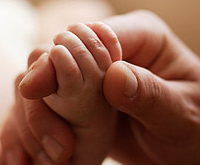This month is a period of great adjustment for you and your baby. We help you to cope during this difficult month. Also read Your Newborn Baby.
What we will look at
- Bringing your baby home
- Visitors
- Your baby’s first bath
- Swaddling
- Cutting your baby’s nails
- How much sleep does your baby need?
- Your baby’s first outing
- Car seats
- What’s in a bag?
- Confusing day and night
- Why do babies cry?
- Your baby’s stools
- Cot death
- What you can do to stimulate your baby
What can your baby do?
- Focuses on your face while breastfeeding
- Responds to sound
Bringing your baby home
Your baby’s first introduction to his/her new home is a special time for parents. But don’t be surprised if your baby cries more often, struggles to fall asleep or feeds more poorly than in hospital. Your baby has to adjust to his/her new environment and it will take a while to settle in.
Visitors
You will soon find out that loads of friends and relatives want to visit you when you’re out of hospital. Although they mean well, you need your rest and these visits can be inconvenient and very tiring for you. Ask them to phone in advance rather than just popping in. Reserve the right to ask them to come at another time if you don’t feel up to entertaining visitors.
Your baby’s first bath
It is normal to feel scared and unsure about bathing your baby. You may probably feel quite clumsy and scared that he/she may slip.
What will make it easier and how should you go about it? Click here.
Swaddling
Swaddling (wrapping your baby with a towel or blanket) for short periods can help a small baby feel secure and can calm down a restless baby. Keep your baby’s hands free when he is asleep and when breastfeeding.
- Fold the top 30cm of a towel or blanket.
- Place your baby in the middle with his shoulders inside the top edge.
- Tuck one side of the baby under the opposite arm.
- Fold the blanket over the baby’s feet.
- Tuck the last piece of blanket over the exposed arm.
- Make sure nothing covers the baby’s face – ever!
Cutting your baby’s nails
To avoid cuts and injuries, wait until the baby is asleep before attempting to cut the nails. Using a pair of scissors designed for babies, cut the nails straight across.
How much sleep does your baby need?
At this stage your baby sleeps about sixteen hours a day – if you’re lucky!
Your baby’s first outing
The first outing can be quite intimidating and scary for new mothers. What can you do to make it easier?
- Right timing: its best to travel after a feed and nappy change.
- Pack well: see What’s in a bag?
- Be realistic: don’t plan a long trip away from home. Stick to familiar places close to home.
- Baby-friendly environments: if you plan to go shopping, go to a centre with baby changing and feeding facilities. Ask other mothers for advice.
- Where’s that dummy? To spare yourself from scratching around for a dummy while you are driving, fasten his/her dummy with a dummy chain.
Car seats
- Always use a car seat and help your child form a lifelong habit of buckling up.
- Read the manufacturer's instructions and always keep them with the car seat.
- Make sure that you know how to fasten and unfasten the car seat and how to adjust shoulder straps.
- Children in rear-facing car seats should never be placed in a front seat equipped with an air bag.
Learn which car seat to get for your baby.
What’s in a bag?
If you don’t want to find out the hard way, read our tips on what to pack:
- Spare nappies
- A changing mat
- Breast pads
- If you bottle feed, pack an extra bottle of formula feed
- An extra set of clothing (you may want to take an extra top for yourself as well)
- A baby blanket in winter
- A dummy chain
- Wipes
- Plastic bags for used nappies
Confusing day and night
Your baby can’t distinguish between day and night. Help her adjust by keeping the room dark at night and using a dimmer during night feeds. If she sleeps longer than three hours during the day, wake her.
Why do babies cry?
There are dozens of reasons for this, but here are the most common ones:
- Hunger
- Too hot or too cold
- Wind
- Wet or soiled nappy
- Undressing
- Losing a dummy
- Sudden loud noises
- Colic
Your baby’s stools
A breastfed baby will have soft yellow stools. During the first few weeks she will probably pass stools after every feed. Don’t worry about constipation – it is highly unlikely in breastfed babies. Some breastfed babies may not pass a stool for four to five days.
Cot death
Cot death is one of the things parents fear most. Learn about cot death and what you can do to help prevent it.
What you can do to stimulate your baby
- Affection - give lots of cuddles
- Your baby likes rhythm - sing lullabies, and rock and sway your baby
If your baby is awake and wants to engage with you, you could try the following:
- Encourage head movement by moving your fingers or a coloured object through your baby’s field of vision
- Help your baby to open his/her fingers by playing games in which you unfold the fingers one at a time




 Publications
Publications
 Partners
Partners














